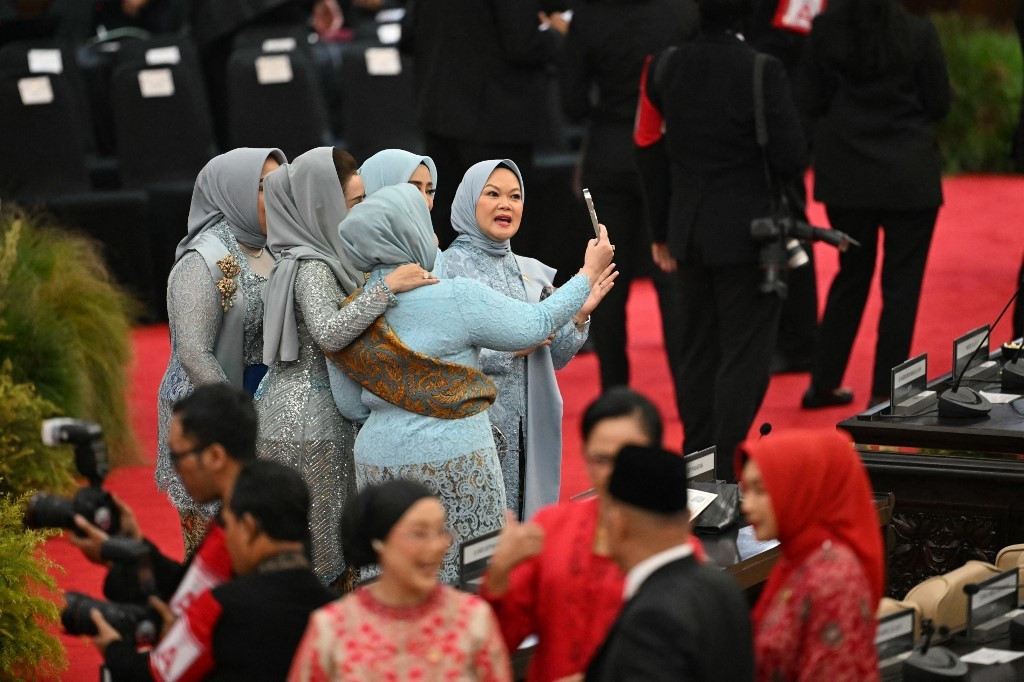News
New gender quota in House is a victory of sorts
Tenggara Strategics November 10, 2025 Female lawmakers of the House of Representatives pose for a photo before the start of the inauguration ceremony of President Prabowo Subianto on Oct. 20, 2024, at the Senayan legislative complex in Central Jakarta. (AFP/Bay Ismoyo)
Female lawmakers of the House of Representatives pose for a photo before the start of the inauguration ceremony of President Prabowo Subianto on Oct. 20, 2024, at the Senayan legislative complex in Central Jakarta. (AFP/Bay Ismoyo)
The latest Constitutional Court (MK) ruling ordering the House of Representatives to ensure a minimum of 30 percent women representation in all its internal bodies sounds progressive, but implementing it could be a challenge when women make up only 22 percent of all 580 House members.
Bottom line: There are not enough women members to spread around to meet the quota.
The gender quota, part of the MK's campaign to promote affirmative action policies in the country's political institutions, puts the burden on political parties to position their women representatives across different House commissions and other bodies more evenly.
Besides the 13 commissions, the House has seven other agencies overseeing, among others, the House's budget, agenda, and ethics.
Many women House members have been assigned to commissions dealing with social issues, women, and children. The ruling aims to make sure that women are also involved in as many other matters as possible, including the economy, law, energy, and security.
Speaker Puan Maharani says the House will comply with the court ruling to ensure women are better represented in various commissions, not just in terms of the numbers, but also in terms of holding notable positions.
Alas, this is not her call to make.
Some political parties may not have enough women representatives in the first place to spread around the different commissions. There is also the question of the quality and capacity of some women members, many ill-prepared due to the way they were recruited into electoral politics.
MK took the threshold from the legislative election law that requires women to represent at least 30 percent of all the nominations by political parties. It is also the mandatory figure for women's representation in executive boards of political parties.
Parties struggling in recruiting women resorted to nominating the wives, daughters, and nieces of politicians to meet the quota. Some recruited artists in their twilight years with enough popularity and wealth to bankroll their expensive election campaigns.
With the election in the hands of voters, most of these women candidates never made it to the House. In the 2024 legislative elections, 128 women were elected, or 22 percent of the total House members. Short of the 30 percent target, it is still historically the highest women's representation in the House.
The Indonesian Democratic Party of Struggle (PDI-P), which won the most House seats, has the highest women's representation, followed by the Golkar Party and the Democratic Party. They have more women representatives to spread around the different commissions. Other parties simply do not have the members.
Some women politicians made it and even excelled in what is essentially still a man's world.
Case in point is Meutya Hafid, the current minister of communication and digital, who carved her political career as a House member for Golkar, and for years served in the notable Commission I, dealing with foreign affairs and national security.
Another is Rahayu Saraswati, niece of President Prabowo Subianto and representing Gerindra, who had been co-chair of Commission VII, dealing with industry, small and medium enterprises, tourism, and creative economy. Rahayu resigned in September following social media pressures because of a statement she had made in a TV program in February. She claimed her statement had been manipulated, but apologized nevertheless. Netizens still did not let her off the hook and demanded her resignation.
High-caliber women politicians are still the exceptions rather than the rule, even among the 128 current women House members. Most ended up being assigned by their parties to sit in commissions dealing with mundane, though no less important, issues like the protection of children and women.
Now, they are being asked to get out of their comfort zone.
The MK ruling seeks to change this, responding to a petition from women's organizations and activists. Some of these organizations run programs to strengthen the skills of women politicians.
The fact that these groups settle for a 30 percent quota for women in the various legislations for political institutions, including the latest MK ruling, instead of 50 percent, which would be more representative of the number of women in the country, indicates that the bigger part of the problem is in recruiting more women into politics.
What we've heard
A senior legislator said that the House could immediately implement the MK's ruling within its current term. "Discussions with representatives from each faction will be held soon," the lawmaker said.

